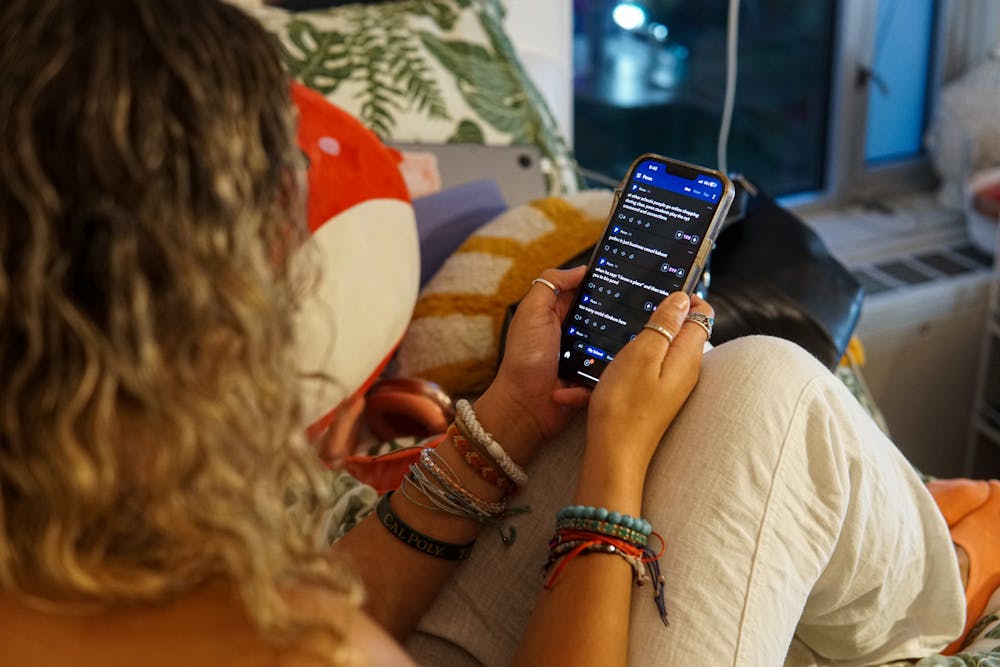
Columnist Hanadi Abdulkadir argues that the anonymity of Sidechat gives rise to possible lack of cultural awareness.
Credit: Giuliana AllevaMany students at Penn and throughout the nation remember the Supreme Court’s ruling striking down affirmative action in the college admissions process this summer. While many individuals publicly expressed the nuances behind the decision and what this could mean for the future of higher education, others took a more anonymous approach.
Away from the spotlight of public scrutiny, some individuals on Sidechat took the opportunity to “note general trends” of perceived incompetency among African American and Hispanic students. Even when other users attempted to point out the blatant form of prejudice in the posts, a number of responses rebutted that “if you don’t like it here, then don’t move here”. That’s all to say that some of us were already here long before considering college, and that every student has the right to express issues central to their identities while pursuing an education.
Most students don’t consider that even if their identity doesn’t leave the safety of the online platform, much of the comments they make do:Whether it’s questioning if students of color deserve their place on campus after affirmative action, or if financial aid should prioritize middle-class students by disregarding low-income ones. The knowledge that individuals throughout campus are making these comments on Sidechat — unburdened by accountability — raises the question of where our peers’ genuine moralities and beliefs lie.
Considering the amount of imposter syndrome Black students in elite institutions internalize without Sidechat, seeing reminders of them online becomes inescapable. Even when some students don’t regularly use Sidechat themselves, the discourse offered on the platform influence general points of conversation on campus. It feels nearly impossible to have genuine interactions with other students when faced with the reality that they could’ve been among the hundreds of people to like or author a distasteful post.
This is especially relevant when applied to the broader context of Philadelphia, a city with a long history of racial injustice and dehumanization of Black people in neighboring communities. The beliefs that spread on campus are not just confined to the Penn bubble. They become actions that students use to navigate the city and policies that impact the future of communities like mine. Pushing narratives that people fall within specific boxes drives a wedge between them.
A lack of cultural awareness is not something that can be remedied through the back and forth arguments rampant on Sidechat. Many students believe that their place at this school validates the way they look down on others, even when they lack the lived experiences of the people they are looking down upon. Even when moderators are meant to limit the amount of misinformation that circulates through platforms like this, certain harmful posts can fall through the cracks and gain traction before they are removed. Additionally, when some of these posts garner a lot of attention, it signifies to others that what they say must be the truth, even if it may be rooted entirely in their opinion.
All things considered, Sidechat can be a useful platform, with its relatable content, funny memes, and general advice on how to navigate life at Penn. Even I tend to frequent it when the stress of classes becomes overwhelming.
However, the judgements made about deeper social issues tied to the city and its inhabitants need to be made with greater nuance. Moving forward, it’s important to consider the intent behind some of the posts made, especially when they only supply one person’s perspective of any given event. While Sidechat can be a helpful way to become familiar with issues currently circulating campus, it’s necessary for users on both sides of the platform to consider how far they want their message to go.
Writing in anonymity does not absolve anyone from their responsibility to reassess their biases and think twice before they make comments that can further harm disadvantaged people. Nothing online exists within a vacuum, especially when it informs how other students go out into the world and shape the spaces around them.
HANADI ABDULKADIR is a College sophomore studying international relations from Philadelphia. Her email is hanadia@sas.upenn.edu.
The Daily Pennsylvanian is an independent, student-run newspaper. Please consider making a donation to support the coverage that shapes the University. Your generosity ensures a future of strong journalism at Penn.
Donate






